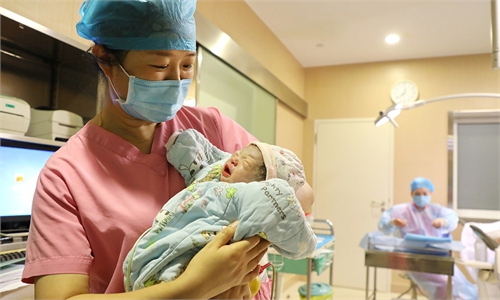
A new born baby in a hospital in China Photo: VCG
The State Council, China's cabinet, decided on Sunday to repeal three administrative regulations related to family planning policies, including regulations on technical services for family planning, social maintenance fees and family planning work for the migrant population.
Experts pointed out that this is a companion change to the revised Population and Family Planning Law in August.
The three administrative regulations are repealed in order to adapt to the new situation of China's population and economic and social development, optimize the fertility policy and promote long-term balanced population development, said the official release.
The cancelled regulations are the Regulation on the Administration of Family Planning Technical Services (enacted in 2001 and revised in 2004), Measures for Administration of Collection of Social Maintenance Fees (enacted in 2002), and Regulation on the Administration of Family Planning Technical Services (enacted in 2009).
All these regulations were developed and implemented during China's one-child policy period.
The revocations came after the National People's Congress Standing Committee, China's top legislature, passed an amendment to the Population and Family Planning Law, which allows each couple to have three children and stipulates support measures for the new policy.
Experts pointed out that the repeal of these regulations is a complementary change to the August revision of the family planning law.
"The corresponding old regulations do not meet the provisions of the new law, so they must be modified or repealed," He Yafu, an independent demographer, told the Global Times on Sunday.
"The Population and Family Planning Law is the higher law, while these three regulations belong to the lower law. The lower law cannot violate the higher law, hence the revocation," He noted.
He predicted that local governments will soon revise their family planning regulations in response and clean up some obsolete policies.
"For example, those who were born in violation of the previous family planning policies would no longer be banned from being civil servants," He said.
He also noted that the duties of workers at local family planning offices will change from family planning education to reproductive health services.
In May, China further lifted its family planning policies and allowed each couple to have up to three children after the number of newborns declined for four years straight, aiming to improve the country's population structure and actively respond to the aging problem. China's total fertility rate declined rapidly from 1.7 per woman in 2016 to 1.3 in 2020.
Experts noted that more detailed measures will be offered by policymakers to support the major policy shift, reducing child-raising burdens.




